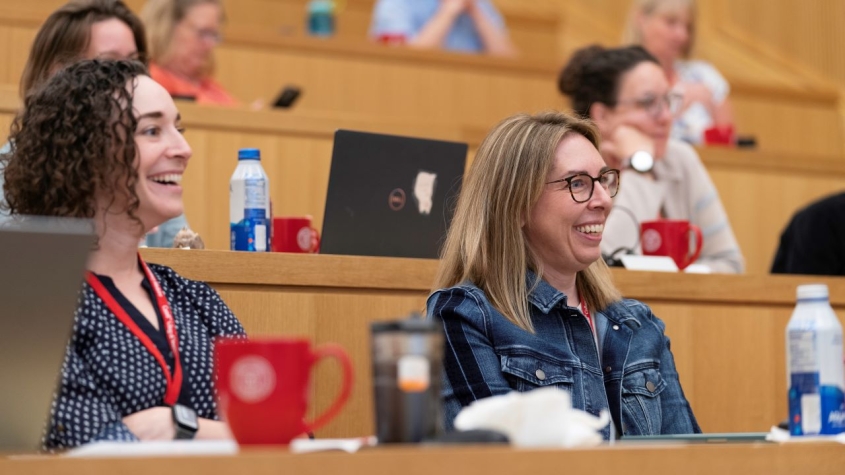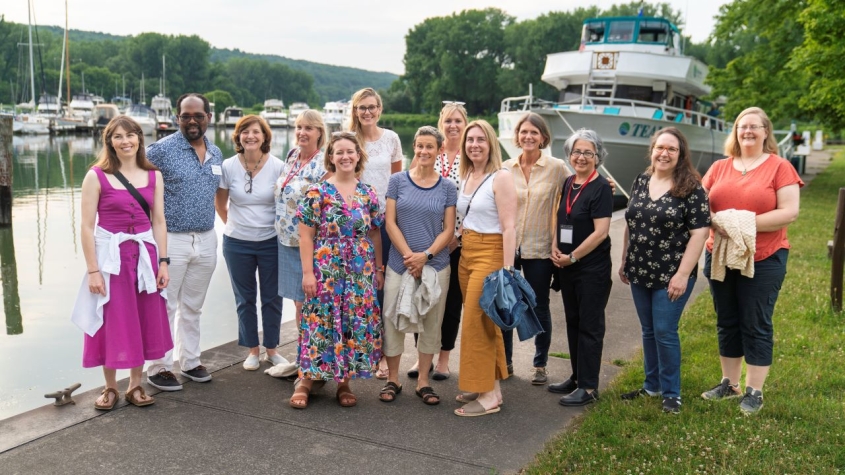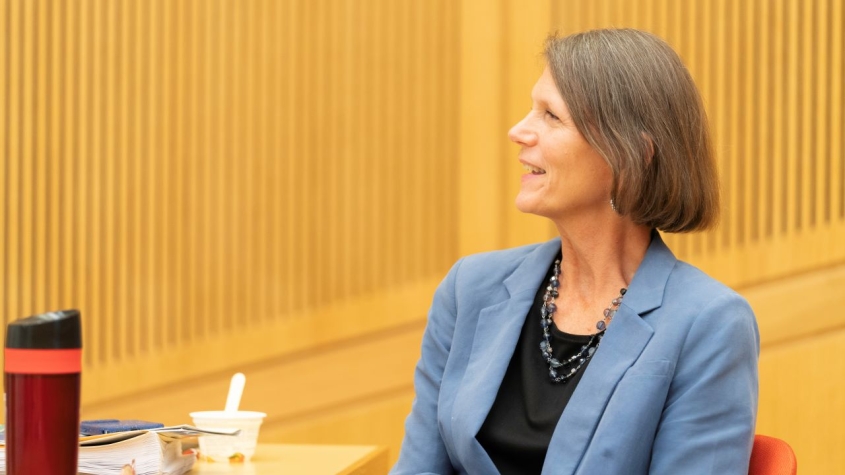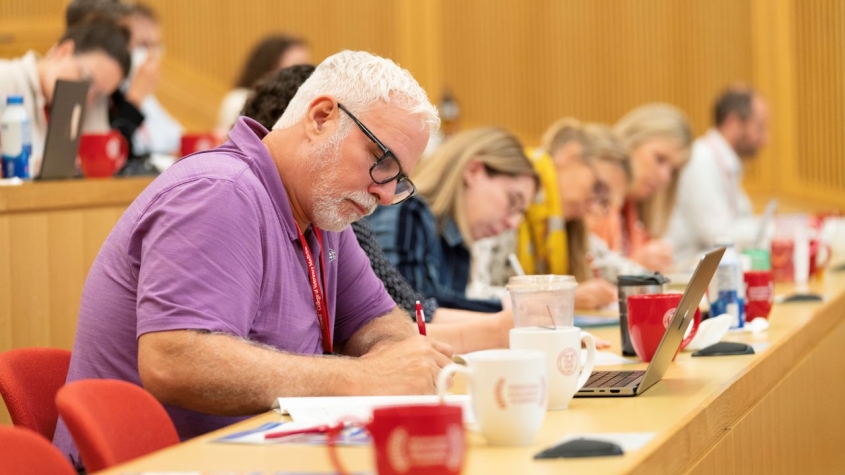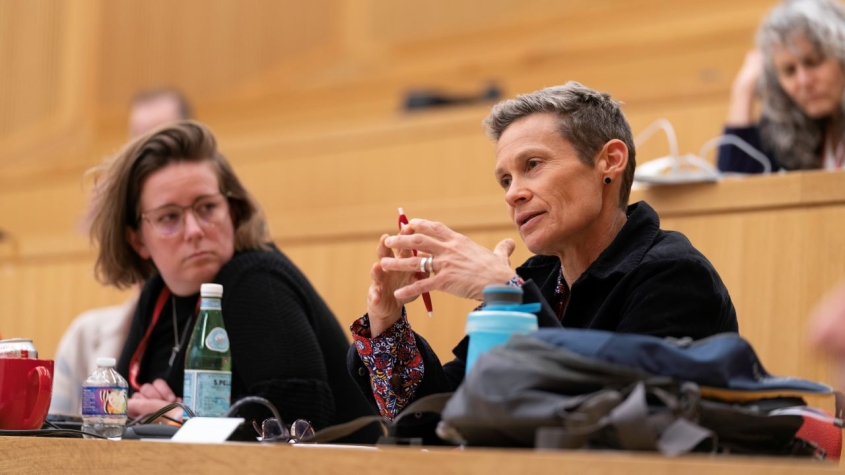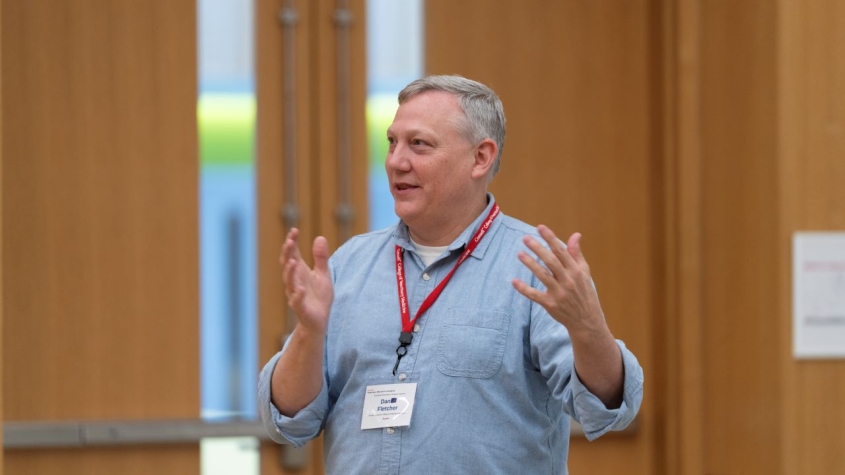Cornell Veterinary Educators Academy hosts spring 2024 conference at Cornell University
On June 21-23, the Cornell Veterinary Educators Academy (CVEA) held its fifth conference in Ithaca, New York. Titled "Educating Generalists for Adaptive Expertise," the event welcomed 40 veterinarians and veterinary educators to the halls of the college, with guests hailing from local regions in New York and as far as Saint Kitts and California. Beginning with a welcome reception cruise on Cayuga Lake, the weekend featured plenty of informal discussions and networking opportunities.
“This conference provided a great opportunity to build professional relationships among veterinary educators committed to preparing learners who can recognize and solve novel or unexpected problems,” said Katherine Edmondson, M.S. ’85, Ph.D. ’89, assistant dean for outreach in health professions education and director of the CVEA. “By sharing their experience as teachers, they engaged in discussions about helping students learn to ‘think outside the box’.”
Presentations by three keynote speakers set the framework for the program. The first, Dr. Naomi Steenhof, assistant professor with the Leslie Dan Faculty of Pharmacy at the University of Toronto, gave a talk titled “Designing for Failure: An Instructional Approach for Future Success.” Her work on “productive struggle” has been shown to better prepare learners for future learning and professional work. The second keynote speaker, Dr. Maria Mylopoulos, senior scientist and associate director of the Wilson Centre for Research in Education and professor of pediatrics and curriculum scientist in M.D. education at the Temerty Faculty of Medicine, University of Toronto, gave her talk, “Renewing Veterinary Education: The Imperative for Adaptive Expertise," which gave an educational framework for developing experts who can meet the ever-changing challenges of the workplace. Together, they gave a workshop where participants were asked to design learning experiences and share practical examples of how productive struggle for adaptive expertise could be applied in their own settings.
On the second day of the conference, Dr. William Cutrer, associate dean of undergraduate education and professor of pediatrics and anesthesiology at Vanderbilt University’s Medical Center, gave the third keynote session titled “Transforming Lifelong Learning from Cliché to Reality: Developing Master Adaptive Learners," which focused on actively engaging learners to develop adaptive expertise and lifelong learning skills, and implications for teaching and curriculum.
All three keynote presentations stimulated discussions that ran throughout the conference, and drew parallels between human and veterinary medicine, as health professionals shared the need to draw from their expertise to think flexibly, recognize the limits of their expertise and solve novel problems. Each of the sessions included opportunities for questions and discussion, a hallmark and popular feature of the CVEA conferences.
Attendees also engaged in workshops on topics such as designing for failure and immersive simulations, and attended talks such as “A Road Warrior’s Approach to Dashboard Didactics,” given by Ann Dwyer, D.V.M.’83. Other highlights of the weekend were the CVEA Fellows presentations on topics such as student assessments using concept maps and mentoring graduate veterinarians’ in practice, and two sessions devoted to conducting and publishing research in veterinary education.
Attendees walked away with lots of applicable take-homes. “The conference has been formatted to promote engagement by scheduling many styles of presentation, including the "lightning rounds" that I provided as well as workshops,” says Dr. Rebecca McOnie, instructor of large animal surgery. “I have left every CVEA conference with practical advice to improve my teaching style and enthusiasm for trialing at least one new technique.”
Dr. Daniel Fletcher, associate professor of emergency and critical medicine at CVM, also enjoyed his time at the conference both as a presenter and as an attendee. “The audience was enthusiastic, engaged, and creative, which made presenting my work more fun. I feel like I learned as much as I shared,” he says, adding, “The concepts around adaptive expertise and productive failure were new for me, and although I think I try to incorporate these approaches in my teaching, learning about ways to more explicitly design my learning interactions to leverage these concepts more fully will be a game changer for me.”
Edmondson closed the weekend with a final address to the attendees. “I am delighted that this conference was such a success,” said Edmondson. “There is momentum behind the conversations that the CVEA conferences support, and it’s gratifying to see the level of excitement and engagement among this community of educators growing. Their enthusiasm for teaching and learning is contagious, and the careful thought they devote to scholarship and reflecting upon their practice will result in important contributions to the field of veterinary education research. The future is bright.”
-Written by Lauren Cahoon Roberts
-Photos by Carol Jennings/CVM



